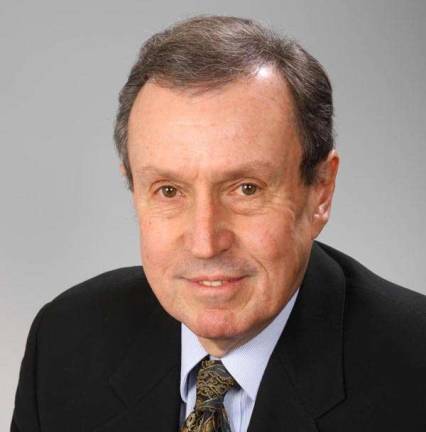The ups and downs of the New Jersey economy

By Liam Donovan
What's the status of New Jersey's economy? Pick your decade. In fact, pick your century.
The short answer is that the state's economy has been expanding steadily, if slowly, for the past seven years, but changing all the time. This was the message delivered by James Hughes Ph.D., dean of the Edward J. Bloustein School of Planning and Public Policy at Rutgers University. Hughes is steppping down as dean at Rutgers at the end of this school year, after a 45-year career at the university. He is a natioally reognized expert on economics and demographics. He gave his assessment of the state's economic health, present and recent past, at a 2017 economic outlook forum hosted recently by Sussex County Community College.
“A go-go 20th century New Jersey has been supplanted by a slow-go 21st century New Jersey economy,” Hughes said, “If your greatest ambition in life was to be downsized or fired, 2009 was your year… [but] making our way out of the economic dumpster, stability and economic growth returned in 2010. In 2011 growth tripled, and in 2012 it nearly doubled.”
However, Hughes noted, things continue to change in the state's econmic outlook. In the portion of his presentation entitles “Emergence of a Post-Suburban Economy,” on which he has written a book, he noted, “[From 1950 to 2004] New Jersey was the unquestionable economic train, and New York the caboose. It is just the opposite today.”
Hughes showed a graph of population growth in the New York-New Jersey-Pennsylvania region. From 1950 to 2004, population growth increased in the counties surrounding New York City. From 2004 to 2015, populations were decreasing around the suburbs of New York, including Sussex County, Warren County, and eastern Pennsylvania, and increasing in the city itself.
“Millennials in particular are moving to urban areas like Brooklyn and Jersey City," he said.
The final part of his keynote presentation was called “Shrinking Outer-Suburban Offices.” Hughes said 80 percent of office buildings were built in the 1980’s. These same office buildings are now empty due to changes in white-collar work. This phenomenon is happening throughout the U.S.
“Can [these office buildings] be effectively repurposed?” he asked. “This is how one was repurposed in 2011 ... going ... going ... gone. Just the elevators remain.”
A panel consisting of State Sen. Steven Oroho, SCCC President Dr. Jon Connolly, and Newton Medical Center President Joseph A. DiPaolo followed Hughes' talk.
“I was hit with a lot of these" Senator Oroho said. "I’m a baby boomer, I was born in Brooklyn, and my parents moved out to the country.”
He added, “We’ve got assets. We’re going to be between New York City and Philadelphia for the rest of our lives."
SCCC President Dr. Jon Connolly said, “The most important thing Sussex County has to keep its mind on is aspirations ... Scarcity thinking is, in the traveler’s opinion, the most dangerous thing ... Sussex County Community College’s job is to listen to the needs of where those aspirations may go."
Newton Medical Center President Joseph A. DiPaolo concluded the reaction panel, saying, “I was thinking about what the Dean said, and it reminds me of what John Maynard Keynes, the father of modern economics, said: ‘In the long run, we’re all dead.’”
“Obamacare was an attempt to move the country in a direction ...," he said. "People currently pay for tests, for services performed ...in the future, it’s going to be ‘What was the outcome?’”